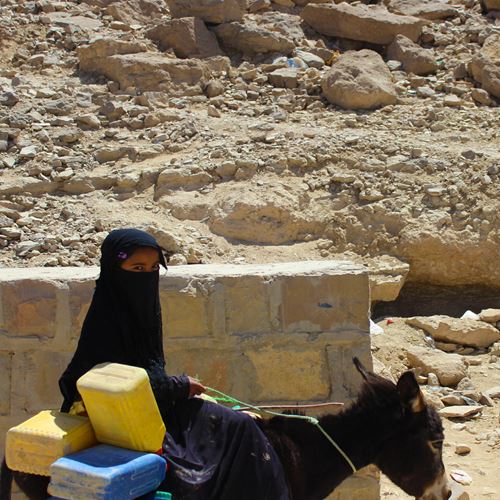Empowering the Sharaqui Community: A Journey of Transformation through Access to Clean Water
Once burdened by water scarcity and the laborious task of fetching water from the valleys, the community of Sharaqui in the mountainous areas of Hajjah underwent a remarkable transformation when Danish Refugee Council (DRC) introduced rainwater harvesting and purifying stations as part of its Yemen Humanitarian Fund (YHF) funded natural resource management program through cash for work. This story highlights the profound impact of improved natural resource management on the lives of the residents, especially in empowering women and supporting children's access to education.

In 2018, DRC built a rainwater harvesting and purifying station in Hajjah, an infrastructure that was meticulously designed and constructed. The purification process involves several stages, effectively eliminating sediments and impurities, thereby providing the community with clean and safe drinking water. Currently serving 50 households, this station continues to benefit approximately 350 individuals, as confirmed by community leader Khalid Abu Salem. Khalid said, “Initially, our wives and young girls were going to the deep valleys to fetch water spending more than 3 hours. Now the water is at hand. The women are taking care of the house while girls are going to school.” The positive impact of this initiative was evident through the testimonials of the community leader and local residents.
Before the construction of the rainwater harvesting station, women and children undertook long and tiresome journeys to fetch water from the valleys, consuming hours of their day. As a result, children could not attend school regularly, and women were unable to participate in livelihood activities.
With the burden of water collection alleviated, women were able to redirect their time and actively engage in agricultural activities, contributing to the economic well-being of their families. Furthermore, access to clean water had an immense impact on children’s education. As a result of the DRC’s YHF-funded project, children in the community were no longer spending hours fetching water and, as a result, were able to attend school regularly. This shift in priorities propelled them towards a brighter future, where dedicated time for education is made available.
The alleviation of water scarcity not only improved residents' health and quality of life but also advanced gender equality. This empowerment of women enabled them to engage actively in economic activities and freed up their time for other daily pursuits. Likewise, it facilitated children's, especially girls', access to education by releasing their time and meeting the household's water requirements. Despite being a seemingly modest natural resource management intervention, DRC's efforts providing the Sharaqui community with access to clean water had an extensive impact on communities, transforming lives, and fostering sustainable development.